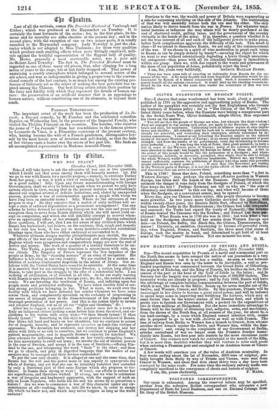IrEw araximrE A CQVISITIONS OF PlFSSIA AND 3INSSIA.
Arle-Dury, 16th Drovember 1855. Sin—The recent acquisition by Prussia of a naval and commercial port on the North Sea seems to have escaped the notice of our journalists in a very remarkable manner ; but it is no less a reality. As soon as war between England and Runia was seen by the latter to be inevitable, a real or pre- tended negotiation was commenced between the Grand Duke of Oldenburg, the nephew of Nicholas, and the Ring of Prussia, his brother-in-law, for the cession of the port at the head of the Gulf of Jahde to "the latter ; and in January last the bargain was concluded for the sum of 500,000 thalera. The 'necessary works are already in progress ; and by July 1856, Russia will have the advantage of complete railway communication between the port of Jahde, which is not, like those on the Baltic, frozen up for seven months out of the 'twelve, and Warsaw, Cracow, and Berlin. By this purchase, Prussia will be encouraged in her desire to become a great naval power, and will be induced to spend large sums in improving and fortifying the harbour, which may at some future time be the winter station of the Russian fleet, and which is pretty sure to furnish our Government with a pretext for the expenditure of two or three millions at Heligoland. But the more immediate advantage to Russia will be the facility of obtaining lead, saltpetre, arms, and machinery, from the shores of the North Sea, at all seasons of the year, for about 8s. a ton land-carriage, by a route which England cannot interfere with, unless she is prepared to go to war with Austria as well as with Pruesia. The line of railway from Berlin to Warsaw has a branch to Cracow, from whence another short branch rejoins the Berlin and Warsaw line, within the Rus- sian frontier; and, owing to the complaints of our Government at Berlin, articles contraband of war no longer cross the Prussian frontier imme- diately into Russia, but first pass into Austria by the more circuitous route of Cracow. Our cruisers now watch for contraband at the mouth of the Elbe, but it is more than doubtful whether they will venture to seize such goods when entering a Prussian portend consigned to an Austrian house at Vienna or Cracow.
A few words will convince you of the value of Austrian neutrality. In four weeks ending about the 1st of November, 5000 tons of sulphur' pro- bably brought from Sicily by way of Trieste and Vienna, were sent from Cracow to Warsaw, and since that date about thirty tons a day have been conveyed by the same route. For some time the ordinary niilway traffic was completely sacrificed to the conveyance of chests and barrels of sulphur.
























 Previous page
Previous page